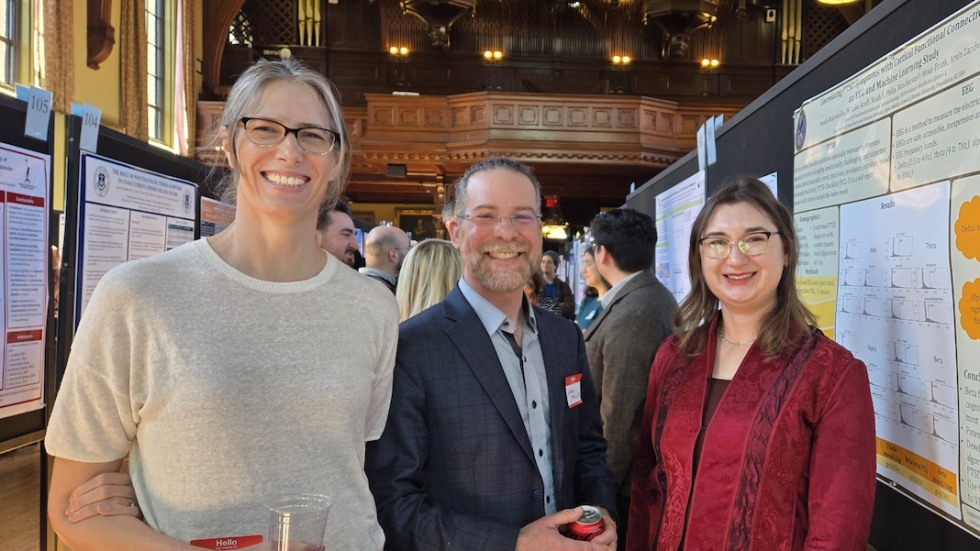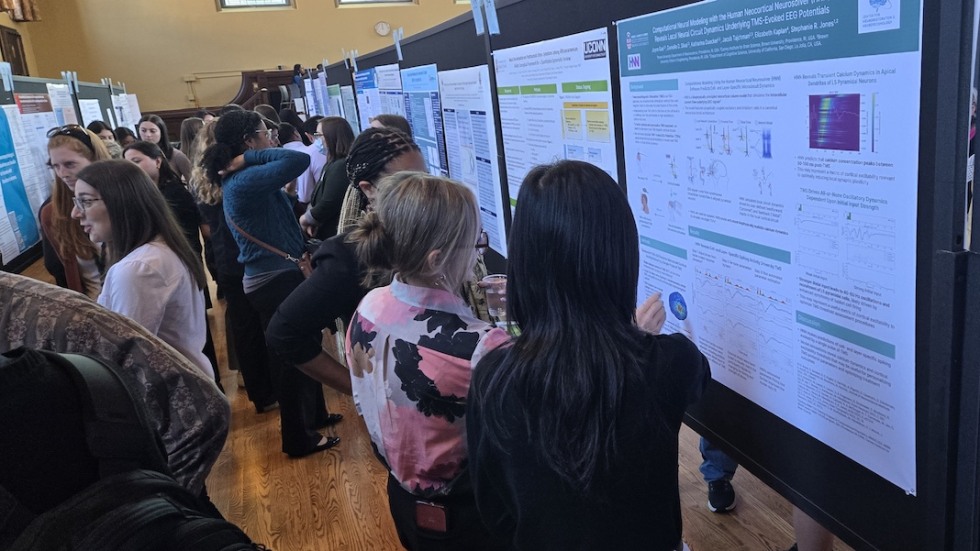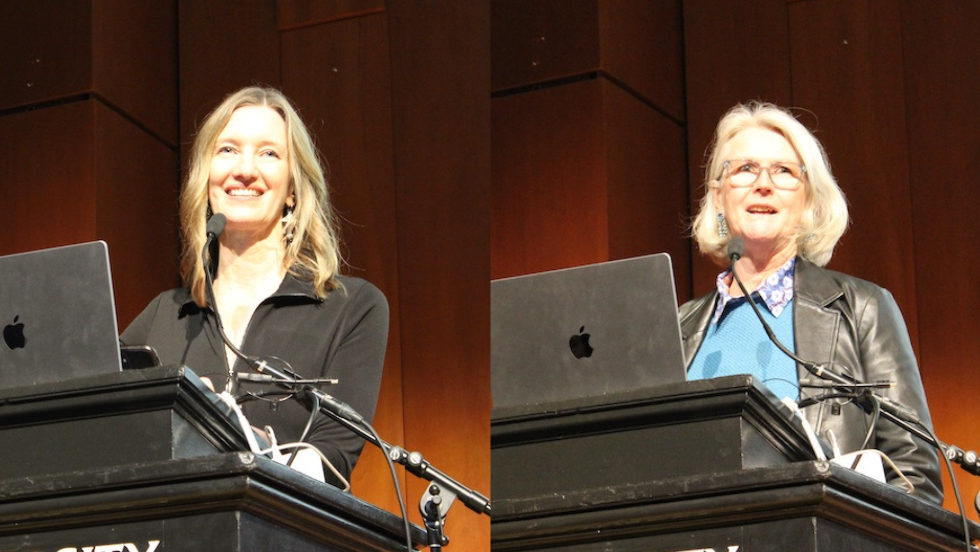27th Mind Brain Research Day Celebrates Spectrum of Research
Research assistant Ruby Cramer shared her poster with postdoctoral fellow Dr. Linda Guzman. They are both part of the BRIDGE program, Brown's research core in dissemination and implementation science.
Research assistant Doudou Tshiyena presented to a group of interested listeners.

Dr. Mascha van 't Wout-Frank (left) and Dr. Noah Philip (center) visit the poster of health science specialist Noelle Marcotullio. All three work in the Center for Neurorestoration and Neurotechnology at the VA Providence Healthcare System.

A total of 138 posters were submitted for this year's Mind Brain Research Day.
Clinical psychology resident Jamilah Silver presents on the development and continuity of common mental disorders from preschool throughout adolescence.

The Sayles Hall poster session blended art and science: A temporary installation of ten cloud sculptures called “Unsui (Cloud Forest),” on loan to Brown from artist Sanford Biggers, "floated" playfully overhead.
Aashri Sadu, a research assistant in the COBRE Center for Sleep and Circadian Rhythms in Child and Adolescent Mental Health, talks with Dr. Noah Philip.
Jihoon Choi, a research assistant in the psychosocial department of Butler Hospital, smiles in front of his poster.

Dr. Audrey Tyrka (L) and Dr. Diane Lipscombe (R) welcomed attendees on behalf of the Department of Psychiatry and Human Behavior and the Carney Institute for Brain Science, respectively.
Dr. Ben Greenberg and Dr. Linda Carpenter moderated a series of research presentations on the theme, "Linking Circuits to Brain Health and Behavior."
This year's program featured talks by Brown researchers. Left to right: Dr. Nicole McLaughlin, Dr. Brian Kavanaugh, Dr. Amanda Arulpragasam, Dr. Matthew Nassar, Dr. Frederike Petzschner, and Dr. Mascha van 't Wout-Frank.
Life-changing research is an investment – the flowering of many dedicated years of training, collaboration, and discovery.
That continuum of research was on vibrant display at the 27th Annual Mind Brain Research Day, hosted March 25 on the Brown campus by the Department of Psychiatry and Human Behavior and the Carney Institute for Brain Science. Investigators in all phases of their careers – students, research assistants, trainees, and faculty – shared their projects in neuroscience and mental health at the day’s bustling poster session, which featured more than 130 posters. New this year, the speaking program showcased a series of short talks by rising-star researchers at Brown doing innovative research on the connections among brain mechanisms, health, and behavior.
Meet four researchers, in different stages of their journey, who shared their projects at the Mind Brain Research Day poster session.
Student: Abigail Jones
A Brown sophomore studying neurobiology, Jones works in the lab of Brian Theyel, M.D., Ph.D., and Frederic Pouille, Ph.D. She stayed on campus over spring break to attend Mind Brain Research Day, her first experience presenting research.
Her research: While collecting data on brain stimulation in live anesthetized mice, Dr. Pouille noticed a potential trend in the data, and gave it to Jones to analyze. Jones found that after stimulating a neuron for just one second, the entire network of neurons had a decreased chance of firing an "up state" – a period of increased activity associated with memory consolidation and sensory processing.
Why it matters: “This shows that a single cell can affect an entire network, which could be big in exploring interventions,” Jones said. “Maybe a single cell could be more important than we thought.”
How she got into research: Jones is just now exploring what it’s like to gather, analyze, and present research data to see if she likes it well enough to pursue professionally. Her take so far: “It’s a lot of fun!”
I’ve gotten really interested in science communication. Being in an inaccessible field, I want to help make it explicit for people. It’s an adventure.
Staff: Ariella Rosen, B.A.
Rosen is a research assistant at Bradley Hospital’s Pediatric Anxiety Research Center. She works closely with Kristen Benito, Ph.D., and David Barker, Ph.D., who specializes in a form of analysis (causally interpretable meta-analysis) that can generalize findings from across different clinical trials.
Her research: For over two years, Rosen has been harmonizing patient data from across 28 clinical trials worldwide on pediatric OCD. This harmonization process – what she calls “a giant logic puzzle” – is an essential step for analyzing data across trials. In her study, Rosen documented the time and resources required for such an intensive process.
Why it matters: Rosen’s study can help other scientists understand the time and money required to analyze data across studies, and budget for the process appropriately. The benefits of undertaking the analysis are manifold: “You get a larger patient population and a lot of different conditions to compare,” she said. Those elements make it easier for researchers to understand what works for whom.
How she got into research: Rosen never liked math growing up, due to her dyslexia. But in college, she took a research assistant position at the New York State Psychiatric Institute that changed everything. “I fell in love with clinical data,” she said. “Properly managed data can tell a patient’s story.”
Good data management isn’t just: ‘Do the number make sense?’ It’s about seeing a patient’s journey unfold on paper.
Trainee: Daliah Ross, Ph.D.
Ross is a first-year postdoctoral fellow in neuropsychology.
Her research: Ross looked at publicly available data on a group of older adults without dementia to determine if cognitive variability on tests was associated with biomarkers related to dementia and Alzheimer’s disease. One of those biomarkers, white matter hyperintensity, is a sign of blood vessel damage in the brain. She found that cognitive variability and white matter hyperintensity are indeed correlated in the context of a core biomarker of Alzheimer’s disease, amyloid.
Why it matters: The association suggests that cognitive variability could serve as an early indicator of dementia risk. “The idea is to get more predictive factors of cognitive decline,” Ross said. “Then we can intervene earlier and flag people to follow more closely over time. There are new treatments for Alzheimer’s disease that work best early on.”
How she got into research: Ross’s interest in research began with her high school job at the DNA Learning Center, which provides educational activities in genetics for kids. She initially conducted neuroscience research on mice, but transitioned into psychology because, she said, “I wanted to work with people.”
I was always interested in how things work and why. I was a very curious, questioning child.
Faculty: Ruben Martinez, Ph.D.
Martinez is an assistant professor of psychiatry and human behavior. He is also acting associate director of the Brown BRIDGE program, an implementation and dissemination science research core.
His research: Design probes are attractively boxed kits of activities – such as journaling exercises and photo prompts – that recipients can use to document how they interact with their environment. The information collected from the probes can be used by health researchers to design interventions that are more likely to suit a target population in their native space. In his study, Martinez tested the design probes with youth and clinicians collecting information for mental health research.
Why it matters: Martinez found that the probes were appealing to youth. “The probes can spark creativity and joy for research teams, too,” he said. Martinez is making the design probe available to other researchers for use in their studies.
How he got into research: As part of a college class on infant cognition, Martinez had the opportunity to interact with preschool-aged children to learn how they processed the world differently. “It sparked this initial fire for me,” he said. That passion ultimately led him to clinical psychology, a field he first encountered as a mental health patient in his teenage years. Now, he says, he is driven to “get treatments in the hands of people who need it the most.”
If I can help get care to ten…twenty…thirty kids, it will be worth it. Ultimately, I hope it will be many more.
2025 Mind Brain Research Day Award Winners
Diversity Research Award
1st place: Kristine Durkin, Ph.D.
Amplifying Young Voices: Strategies for Building and Sustaining a Youth Advisory Panel in Health Research
2nd place: Eliana Boxerman, B.A., and Madeline Rahilly, B.S.
Area Deprivation Index (ADI) and Brain Health in Aging Rhode Islanders: Exploring the Relationships Among Neighborhood Deprivation, Neuropsychological Functioning, and Depressive Symptoms
Undergraduate Student Award
1st Place: Caroline Murray
Quality of Life in Patients and Their Caregivers Presenting with Clinical Features of Normal Pressure Hydrocephalus (NPH)
Graduate/Medical Student Award
1st Place: Benjamine Zide, M.A.
Combining Clinical Symptom Scales and Blood Biomarker Testing to Enhance Accurate, Accessible Diagnosis of Early Alzheimer's Disease
Research Assistant Awards
1st place: Joyce Gao, B.S.
Computational Neural Modeling with the Human Neocortical Neurosolver (HNN) Reveals Local Neural Circuit Dynamics Underlying TMS-Evoked EEG Potentials
2nd place: Samantha Cilli, B.S.
One Year Outcomes from a Randomized Controlled Trial of Transcranial Direct Current Stimulation and Virtual Reality for PTSD
Clinical Psychology Resident Awards
1st place: Jessica Smith, M.S.
The Influence of ADHD, Anxiety, and Psychological Stress on Vigilance and Reaction Time Variability after Sleep Restriction in Adolescents
2nd place: Rachel Keszycki, M.S.
Digital Clock Drawing Performance is Associated with Neuroimaging Biomarkers of Alzheimer’s Disease and Cerebrovascular Disease in Cognitively Healthy Older Adults
Postdoctoral Awards
1st place: Alexis Adams-Clark, Ph.D.
Predictors of Nonconsensual Condom Removal Victimization: Interactions Between Alcohol Use and Minoritized Identities in College Students
2nd place: Destiny Printz Pereira, Ph.D.
Preliminary Findings of a Culturally-Adapted Mindful Parenting Intervention for Black and Hispanic Mothers
Psychiatry Residents Award
1st Place: Brandon Lew, M.D., Ph.D.
Characterizing Neural Oscillatory Activity Related to 10Hz TMS Stimulation for Treatment Resistant Depression